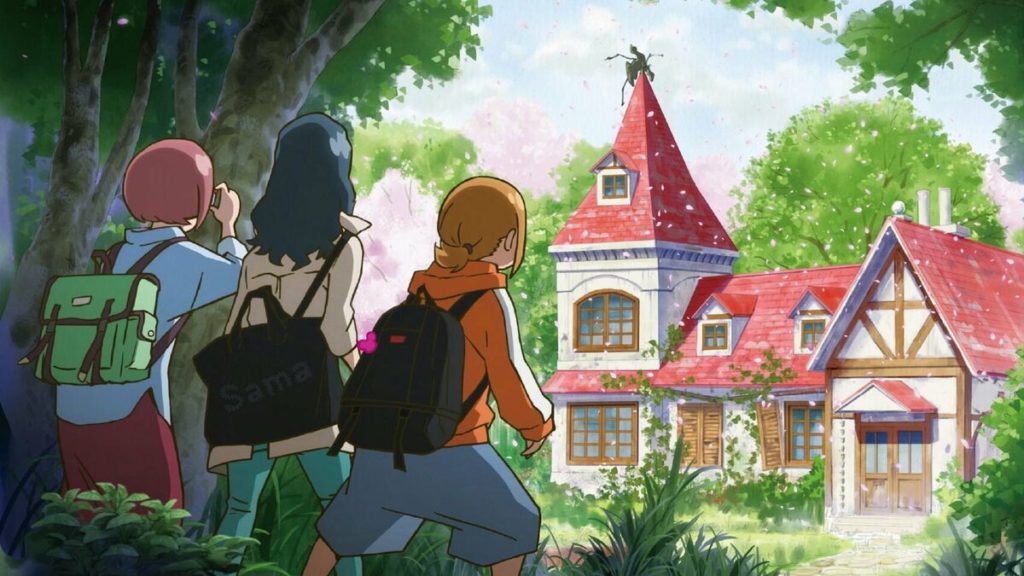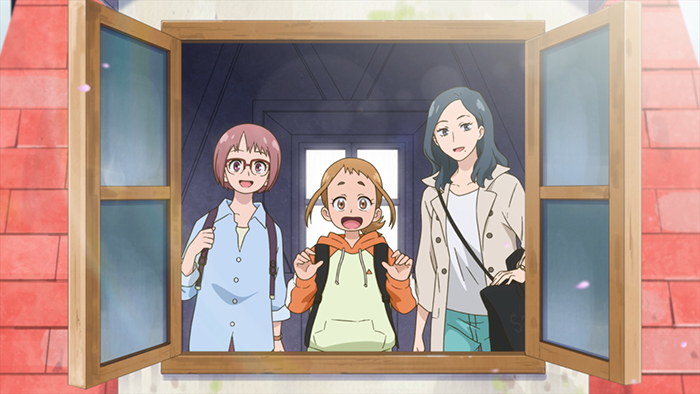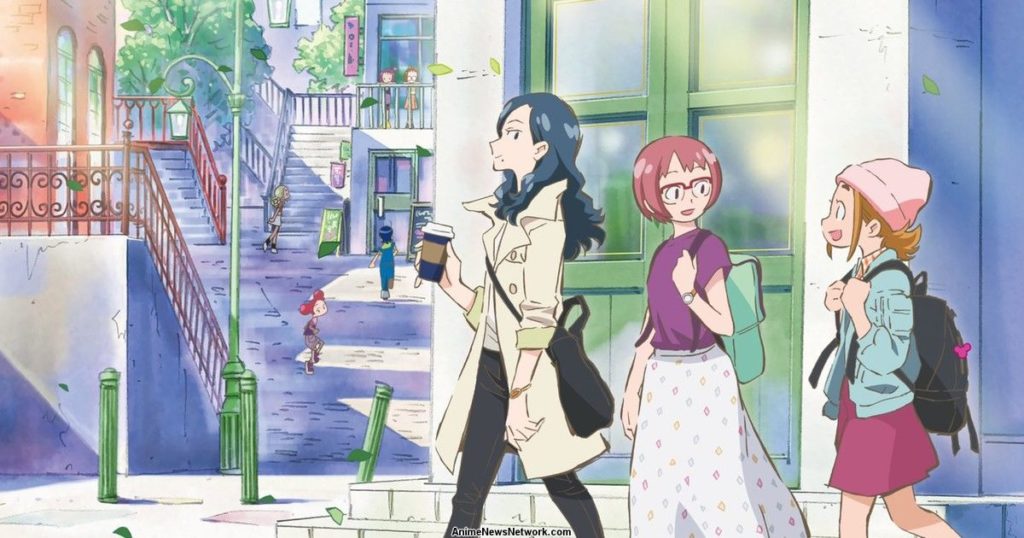Looking for Magical Doremi
April 29, 2023 · 0 comments
By Andrew Osmond.

Looking for Magical Doremi is an anime about three women and their friendship. Unusually for a “friendship” anime, the characters are all past school age, entering into the world of work and serious relationships, and yet the magic from their childhoods is still with them. They’re brought together by their shared love of a “magic girl” TV anime that they saw as youngsters, which still has lessons to teach them.
There’s Mire, fighting battles with her office rivals in a Tokyo trading company. There’s Sora, a trainee teacher who’s having uncertainties about her career path. Finally, there’s Reika, a freelancer whose precious earnings are being gobbled up by a deadbeat boyfriend. Reika’s turning 20, Sora’s 22 and Mire’s 27, so there’s an automatic sense of hierarchy between them (and Reika and Sore are awed by Mire’s company CV, though Mire dismisses it).
The film starts with each of the characters feeling down, and opting to cheer themselves up by going to look at a house in Kamakura (a historical city near Tokyo). The house inspired one of the settings in their favourite anime, Ojamajo Doremi. That’s where they meet and instantly hit it off, resolving to take a holiday together.

The film follows their travels and travails. For example, Reika still misses her father, who she once adored but who left her and her mum when she was still a child. A telling detail: Reika fell for her hopeless boyfriend because his smile reminds her of her dad. Frictions arise between the women over time – for example, Mire is Japanese but she grew up in America, and tends to speak more bluntly than her companions.
For all the cuteness of the animation, and the huge charm of the characters, this isn’t just a feelgood anime. The women have real problems and regrets; crucially, some aren’t solved in the film, and must be lived with and learned from. But each of the characters is resolutely supported by their friends; at different times, two of the trio unite to lift the third. One of the biggest moments of conflict is between the oldest and youngest characters, Mire and Reika, and yet they seem truly alike in that moment, as vulnerable as children.
Looking for Magical Doremi is a singular anime film, yet it’s part of a franchise. The casual viewer might assume that Ojamajo Doremi is just an imaginary “anime in an anime,” like Gekigangar 3 in Nadesico. In fact, Doremi was a real anime series for girls that started in 1999 and ran four years and about two hundred episodes. Two of the last instalments were directed by a rising young animator, Mamoru Hosoda.
The show’s title changed over time – for instance, the last 51 episodes were called Ojemi Doremi Dokkan! But it always kept the same characters, unlike the later Precure magic girl franchise which switches the characters every year to keep youngsters on board. Doremi’s lead trio – Doremi, Hazuki and Aiko – are referenced in the new film, with each of the women having a different girl as her favourite.
Both Looking for Magical Doremi and the original Doremi were animated by Japan’s largest anime studio, Toei Animation. Toei introduced magic girls to anime, in 1966’s Sally the Witch. That was followed by many later Toei series such as 1969’s Ako-chan’s Secret (from an older manga than Sally) and, eventually, Sailor Moon from 1992. Although Sailor Moon was a children’s show, it was clearly made for older viewers than many magic girl series, including Doremi and the franchise that started after it, Toei’s Precure.

In 2013, I interviewed Hidenori Oyama, who was then the Senior Director at Toei Animation. He talked about Precure, saying the girls who watch it could be as young as 3. “We make Precure so that 3-year-old girls can understand it. When they get to around 8, that’s what we call the graduation age when they stop watching it, because they find it too childish. So every year the story and characters change; we’re looking to get new 3 year-old girls as an audience.”
It seems likely the TV Doremi was made for a slightly different age-bracket than Precure. As noted above, the show’s characters didn’t change every year. The characters in Doremi are elementary schoolers, but the series was never just fantasy. A retrospective on the Wave Motion Cannon website points up how one of the leads, Aiko, has divorced parents, and this isn’t shown as melodramatically tragic but just a sad fact of life. It’s no surprise that in Looking for Magical Doremi, Aiko is the favourite character of a woman who also has divorced parents, who sees herself in Aiko on screen.
Notably, the women in the film all love the Ojamajo series without being in “fandom.” They don’t write doujinshi or fan fiction; they don’t cosplay; they never go to a convention. It’s hard to imagine an American or British film or series having a character who loves a fantastical show without having a massive collection of merch in their bedroom.
I was trying to think of a Western franchise that’s had an instalment like Looking for Magical Doremi. The best I could come up with was “Love and Monsters,” a 2006 episode of Doctor Who with David Tennant, that was a horrendously patronising spoof of the show’s fandom. Compared to that, the Doremi film is immeasurably broader-minded, to the point that you can enjoy it fully without knowing there’s a franchise beyond it.
Actually, a far better comparison is the Ghibli film Kiki’s Delivery Service, directed by Hayao Miyazaki. Magic does exist in Kiki’s world, and she’s younger than the characters in Looking for Magical Doremi. But it’s another film that takes the magic girl genre and puts it in the grown-up world, of work and boredom and uncertainty about what you’re meant to do with your life.
Looking For Magical Doremi has two directors. One was Yu Kamatani, who has several credits on the Precure anime. The other is a far bigger name, Junichi Sato. He was one of the two main directors on the first 51 episodes of Ojamajo Doremi, and before that he handled the opening season of the Sailor Moon anime. Since then, Sato has helmed the ballet-themed fantasy Princess Tutu and one of the most fan-beloved “friendship” anime series, Aria, set on the waters of Mars.
Andrew Osmond is the author of 100 Animated Feature Films. Looking for Magical Doremi is released by Anime Limited.
Leave a Reply